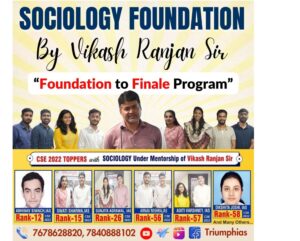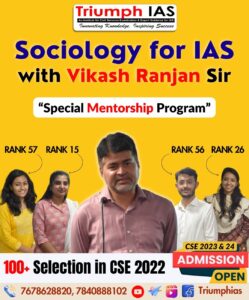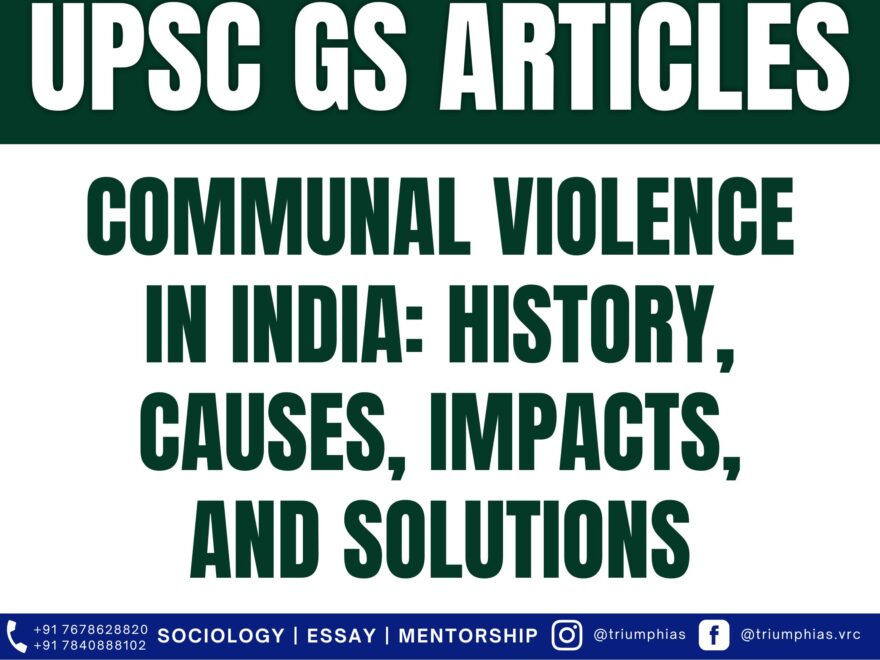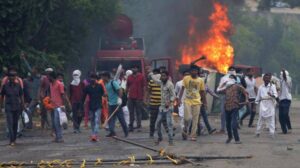Communal Violence: recurring of violence
(Relevant for General Studies Paper Prelims/Mains)

Communal violence constitutes a type of collective aggression that emerges from confrontations between groups of varying religious, ethnic, linguistic, or regional affiliations.
Within India, communal violence is frequently linked to clashes between Hindus and Muslims, although it can encompass other communities like Sikhs, Christians, Buddhists, Dalits, and tribal groups as well.
In accordance with the Indian Penal Code (IPC), communal violence encompasses any action that fosters hostility between distinct groups based on religion, race, place of origin, residence, language, etc. Furthermore, it involves activities that undermine the maintenance of social harmony.
Communal violence has a lengthy historical presence in India, tracing its origins to both the pre-colonial and colonial epochs. This unfortunate phenomenon has persisted even after India gained independence. Key instances marked by communal undertones include the Moplah rebellion of 1921, the Noakhali riots of 1946, the Partition riots of 1947, the demolition of the Babri Masjid in 1992, and more recent occurrences like the Manipur violence and Nuh violence.
The outbreak of communal violence is often sparked by a blend of political, societal, economic, and cultural elements. Such catalysts can encompass elections, religious celebrations, debates about cow protection, conversions, interfaith marriages, disputes over land ownership, migratory movements, media-driven propaganda, and the propagation of hate speech.
The ramifications of communal violence extend deeply into India’s democratic fabric, its secular foundation, human rights ethos, social concord, national security, and overall development.
Causes of Communal Violence in India
- The involvement of political parties and leaders in exploiting communal sentiments to achieve electoral advantages or ideological objectives.
- Employment of communal polarization as a tactic to foster division and control.
- The persistence of ingrained biases and misconceptions against diverse communities.
- The absence of cross-community discussions and confidence.
- The impact of radical groups and entities that disseminate communal animosity and aggression.
- The rivalry for limited resources and openings among various communities.
- The sense of relative lack or bias perceived by marginalized factions.
- The collision of values and ways of life among different communities.
- The gradual decline of cultural variety and diversity.
Impacts of Communal Violence in India
- Communal violence results in the tragic loss of human lives, causing pain for individuals, families, and entire communities.
- The impact of lives cut short leaves lasting scars that span generations.
- Communal violence leads to the devastation of residences, enterprises, and places of worship.
- The weakening or breakdown of social unity, tolerance, and solidarity among distinct communities.
- Communal violence can carry significant economic implications, including the misdirection or squandering of resources and funds.
- The aftermath of communal violence goes beyond physical harm, inflicting psychological trauma.
- The undermining or distortion of democratic values, secularism, the rule of law, justice, etc., within India.
- This erosion also contributes to reduced trust in political institutions and figures. The potential threat or challenge to national, regional, and international security.
Potential Solutions
- The establishment and enforcement of legislation and measures safeguarding the rights and welfare of diverse communities.
- The prevention and prohibition of hate speech, hate crimes, and communal unrest.
- The pursuit and penalization of those responsible for inciting or perpetrating communal violence.
- The enhancement and reformation of political establishments and processes dedicated to addressing communal concerns.
- The creation and empowerment of unbiased and autonomous entities or organizations tasked with observing and probing into instances of communal violence.
To master these intricacies and fare well in the Sociology Optional Syllabus, aspiring sociologists might benefit from guidance by the Best Sociology Optional Teacher and participation in the Best Sociology Optional Coaching. These avenues provide comprehensive assistance, ensuring a solid understanding of sociology’s diverse methodologies and techniques.
Communal Violence, India, Religious Clashes, Ethnic Conflicts, Moplah Rebellion, Noakhali Riots, Babri Masjid, Manipur Violence, Nuh Violence, Political Exploitation, Social Harmony, Human Rights, Democracy, Secularism, National Security, Hate Speech, Legislation, Unbiased Monitoring, Solutions, Best Sociology Optional Coaching, Sociology Optional Syllabus,

Sociology Optional Syllabus

Course Commencement Information
- Enrolment is limited to a maximum of 250 Seats.
- Course Timings: Evening Batch
- Course Duration: 4.5 Months
- Class Schedule: Monday to Saturday
- Batch Starts from: Admission Open Online Batch

Instructional Format:
- Each class session is scheduled for a duration of two hours.
- At the conclusion of each lecture, an assignment will be distributed by Vikash Ranjan Sir for Paper-I & Paper-II coverage.
Study Material:
- A set of printed booklets will be provided for each topic. These materials are succinct, thoroughly updated, and tailored for examination preparation.
- A compilation of previous years’ question papers (spanning the last 27 years) will be supplied for answer writing practice.
- Access to PDF versions of toppers’ answer booklets will be available on our website.
- Post-course, you will receive two practice workbooks containing a total of 10 sets of mock test papers based on the UPSC format for self-assessment.
Additional Provisions:
- In the event of missed classes, video lectures will be temporarily available on the online portal for reference.
- Daily one-on-one doubt resolution sessions with Vikash Ranjan Sir will be organized post-class.
Syllabus of Sociology Optional
Paper-1
FUNDAMENTALS OF SOCIOLOGY
- Sociology – The Discipline
- Sociology as Science:
- Research Methods and Analysis:
- Sociological Thinkers:
- Karl Marx- Historical materialism, mode of production, alienation, class struggle.
- Emile Durkheim- Division of labour, social fact, suicide, religion and society.
- Max Weber- Social action, ideal types, authority, bureaucracy, protestant ethic and the spirit of capitalism.
- Talcott Parsons- Social system, pattern variables.
- Robert K. Merton- Latent and manifest functions, conformity and deviance, reference groups.
- Mead – Self and identity.
- Stratification and Mobility:
- Concepts- equality, inequality, hierarchy, exclusion, poverty and deprivation.
- Theories of social stratification- Structural functionalist theory, Marxist theory, Weberian theory.
- Dimensions – Social stratification of class, status groups, gender, ethnicity and race.
- Social mobility- open and closed systems, types of mobility, sources and causes of mobility.
- Works and Economic Life:
- Social organization of work in different types of society- slave society, feudal society, industrial /capitalist society
- Formal and informal organization of work.
- Labour and society.
- Politics and Society:
- Sociological theories of power.
- Power elite, bureaucracy, pressure groups, and political parties.
- Nation, state, citizenship, democracy, civil society, ideology.
- Protest, agitation, social movements, collective action, revolution.
- Religion and Society:
- Sociological theories of religion.
- Types of religious practices: animism, monism, pluralism, sects, cults.
- Religion in modern society: religion and science, secularization, religious revivalism, fundamentalism.
- Systems of Kinship:
- Family, household, marriage.
- Types and forms of family.
- Lineage and descent.
- Patriarchy and sexual division of labour.
- Contemporary trends.
- Social Change in Modern Society:
- Sociological theories of social change.
- Development and dependency.
- Agents of social change.
- Education and social change.
- Science, technology and social change.
Paper-2
INDIAN SOCIETY: STRUCTURE AND CHANGE
INTRODUCING INDIAN SOCIETY
- Perspectives on the study of Indian society:
- Indology (GS. Ghurye).
- Structural functionalism (M N Srinivas).
- Marxist sociology (A R Desai).
- Impact of colonial rule on Indian society :
- Social background of Indian nationalism.
- Modernization of Indian tradition.
- Protests and movements during the colonial period.
- Social reforms.
SOCIAL STRUCTURE
- Perspectives on the study of Indian society:
- The idea of Indian village and village studies.
- Agrarian social structure – evolution of land tenure system, land reforms.
- Caste System:
- Perspectives on the study of caste systems: GS Ghurye, M N Srinivas, Louis Dumont, Andre Beteille.
- Features of caste system.
- Untouchability – forms and perspectives.
- Tribal communities in India
- Definitional problems.
- Geographical spread.
- Colonial policies and tribes.
- Issues of integration and autonomy.
- Social Classes in India:
-
- Agrarian class structure.
-
-
- Industrial class structure.
- Middle classes in India.
-
- Systems of Kinship in India:
- Lineage and descent in India.
- Types of kinship systems.
- Family and marriage in India.
- Household dimensions of the family.
- Patriarchy, entitlements and sexual division of labour
- Religion and Society:
- Religious communities in India.
- Problems of religious minorities.
- Patriarchy, entitlements and sexual division of labour
SOCIAL CHANGES IN INDIA
- Visions of Social Change in India:
- Idea of development planning and mixed economy
- Constitution, law and social change.
- Education and social change.
- Rural and Agrarian transformation in India:
- Programmes of rural development, Community Development Programme, cooperatives,poverty alleviation schemes
- Green revolution and social change.
- Changing modes of production in Indian agriculture.
- Problems of rural labour, bondage, migration.
3. Industrialization and Urbanisation in India:
-
- Evolution of modern industry in India.
- Growth of urban settlements in India.
- Working class: structure, growth, class mobilization.
- Informal sector, child labour
- Slums and deprivation in urban areas.
4. Politics and Society:
-
- Nation, democracy and citizenship.
- Political parties, pressure groups , social and political elite
- Regionalism and decentralization of power.
- Secularization
5. Social Movements in Modern India:
-
- Peasants and farmers movements.
- Women’s movement.
- Backward classes & Dalit movement.
- Environmental movements.
- Ethnicity and Identity movements.
6. Population Dynamics:
-
- Population size, growth, composition and distribution
- Components of population growth: birth, death, migration.
- Population policy and family planning.
- Emerging issues: ageing, sex ratios, child and infant mortality, reproductive health.
7. Challenges of Social Transformation:
-
- Crisis of development: displacement, environmental problems and sustainability
- Poverty, deprivation and inequalities.
- Violence against women.
- Caste conflicts.
- Ethnic conflicts, communalism, religious revivalism.
- Illiteracy and disparities in education.
About Vikash Ranjan Sir

Vikash Ranjan Sir
(Best Sociology Optional Teacher, Educator, Mentor & Author)
Mr. Vikash Ranjan, arguably the Best Sociology Optional Teacher, has emerged as a versatile genius in teaching and writing books on Sociology & General Studies. His approach to the Sociology Optional Syllabus / Sociology Syllabus is remarkable, and his Sociological Themes and Perspectives are excellent. His teaching aptitude is Simple, Easy and Exam Focused. He is often chosen as the Best Sociology Teacher for Sociology Optional UPSC aspirants.
About Triumph IAS
Innovating Knowledge, Inspiring Success We, at Triumph IAS, pride ourselves on being the best sociology optional coaching platform. We believe that each Individual Aspirant is unique and requires Individual Guidance and Care, hence the need for the Best Sociology Teacher. We prepare students keeping in mind his or her strength and weakness, paying particular attention to the Sociology Optional Syllabus / Sociology Syllabus, which forms a significant part of our Sociology Foundation Course.
Course Features
Every day, the Best Sociology Optional Teacher spends 2 hours with the students, covering each aspect of the Sociology Optional Syllabus / Sociology Syllabus and the Sociology Course. Students are given assignments related to the Topic based on Previous Year Question to ensure they’re ready for the Sociology Optional UPSC examination.
Regular one-on-one interaction & individual counseling for stress management and refinement of strategy for Exam by Vikash Ranjan Sir, the Best Sociology Teacher, is part of the package. We specialize in sociology optional coaching and are hence fully equipped to guide you to your dream space in the civil service final list.
Specialist Guidance of Vikash Ranjan Sir
 Vikash Ranjan Sir is a specialist and arguably the Best Sociology Optional Teacher. His scientific, systematic, applied & exam-focused approach has helped many students to get selected in the Civil Services.
Vikash Ranjan Sir is a specialist and arguably the Best Sociology Optional Teacher. His scientific, systematic, applied & exam-focused approach has helped many students to get selected in the Civil Services.
The Best Sociology Teacher helps students to get a complete conceptual understanding of each and every topic of the Sociology Optional Syllabus / Sociology Syllabus, enabling them to attempt any of the questions, be direct or applied, ensuring 300+ Marks in Sociology Optional.
Classrooms Interaction & Participatory Discussion
The Best Sociology Teacher, Vikash Sir, ensures that there’s explanation & DISCUSSION on every topic of the Sociology Optional Syllabus / Sociology Syllabus in the class. The emphasis is not just on teaching but also on understanding, which is why we are known as the Best Sociology Optional Coaching institution.
Preparatory-Study Support
 The Sociology Foundation Course is designed to provide students with a strong base for the Sociology Optional. Study support from Triumph IAS & personal mentorship of the Best Sociology Teacher, Vikash Sir, is provided till final selection. Vikash Sir provides special guidance session for “Essay & Mains General Study” too, making our Sociology Course a well-rounded one.
The Sociology Foundation Course is designed to provide students with a strong base for the Sociology Optional. Study support from Triumph IAS & personal mentorship of the Best Sociology Teacher, Vikash Sir, is provided till final selection. Vikash Sir provides special guidance session for “Essay & Mains General Study” too, making our Sociology Course a well-rounded one.
Online Support System (Oss)
Get access to an online forum for value addition study material, journals, and articles relevant to Sociology on www.triumphias.com. Ask preparation related queries directly to the Best Sociology Teacher, Vikash Sir, via mail or WhatsApp.
Strategic Classroom Preparation
 Our Sociology Course is characterized by interactive and applied teaching with an “Exam Focussed” approach, which inculcates a Sociological sense and competency in the students. The Sociology Foundation Course, lasting four months, includes theoretical discussion, concept building, and answer writing with a focus on learning & application.
Our Sociology Course is characterized by interactive and applied teaching with an “Exam Focussed” approach, which inculcates a Sociological sense and competency in the students. The Sociology Foundation Course, lasting four months, includes theoretical discussion, concept building, and answer writing with a focus on learning & application.
Comprehensive Study Material
We provide printed booklets of concise, well-researched, exam-ready study material for every unit of the Sociology Optional Syllabus / Sociology Syllabus, making us the Best Sociology Optional Coaching platform.
Why Vikash Ranjan’s Classes for Sociology?
Proper guidance and assistance are required to learn the skill of interlinking current happenings with the conventional topics. VIKASH RANJAN SIR at TRIUMPH IAS guides students according to the Recent Trends of UPSC, making him the Best Sociology Teacher for Sociology Optional UPSC.
At Triumph IAS, the Best Sociology Optional Coaching platform, we not only provide the best study material and applied classes for Sociology for IAS but also conduct regular assignments and class tests to assess candidates’ writing skills and understanding of the subject.
Choose The Best Sociology Optional Teacher for IAS Preparation?
At the beginning of the journey for Civil Services Examination preparation, many students face a pivotal decision – selecting their optional subject. Questions such as “which optional subject is the best?” and “which optional subject is the most scoring?” frequently come to mind. Choosing the right optional subject, like choosing the best sociology optional teacher, is a subjective yet vital step that requires a thoughtful decision based on facts. A misstep in this crucial decision can indeed prove disastrous.
Ever since the exam pattern was revamped in 2013, the UPSC has eliminated the need for a second optional subject. Now, candidates have to choose only one optional subject for the UPSC Mains, which has two papers of 250 marks each. One of the compelling choices for many has been the sociology optional. However, it’s strongly advised to decide on your optional subject for mains well ahead of time to get sufficient time to complete the syllabus. After all, most students score similarly in General Studies Papers; it’s the score in the optional subject & essay that contributes significantly to the final selection.
“A sound strategy does not rely solely on the popular
Opinion of toppers or famous YouTubers cum teachers.”
It requires understanding one’s ability, interest, and the relevance of the subject, not just for the exam but also for life in general. Hence, when selecting the best sociology teacher, one must consider the usefulness of sociology optional coaching in General Studies, Essay, and Personality Test.
The choice of the optional subject should be based on objective criteria, such as the nature, scope, and size of the syllabus, uniformity and stability in the question pattern, relevance of the syllabic content in daily life in society, and the availability of study material and guidance. For example, choosing the best sociology optional coaching can ensure access to top-quality study materials and experienced teachers. Always remember, the approach of the UPSC optional subject differs from your academic studies of subjects. Therefore, before settling for sociology optional, you need to analyze the syllabus, previous years’ pattern, subject requirements (be it ideal, visionary, numerical, conceptual theoretical), and your comfort level with the subject.
This decision marks a critical point in your UPSC – CSE journey, potentially determining your success in a career in IAS/Civil Services. Therefore, it’s crucial to choose wisely, whether it’s the optional subject or the best sociology optional teacher. Always base your decision on accurate facts, and never let your emotional biases guide your choices. After all, the search for the best sociology optional coaching is about finding the perfect fit for your unique academic needs and aspirations.
To master these intricacies and fare well in the Sociology Optional Syllabus, aspiring sociologists might benefit from guidance by the Best Sociology Optional Teacher and participation in the Best Sociology Optional Coaching. These avenues provide comprehensive assistance, ensuring a solid understanding of sociology’s diverse methodologies and techniques. Sociology, Social theory, Best Sociology Optional Teacher, Best Sociology Optional Coaching, Sociology Optional Syllabus.
Best Sociology Optional Teacher, Sociology Syllabus, Sociology Optional, Sociology Optional Coaching, Best Sociology Optional Coaching, Best Sociology Teacher, Sociology Course, Sociology Teacher, Sociology Foundation, Sociology Foundation Course, Sociology Optional UPSC, Sociology for IAS,
Follow us :
🔎 https://www.instagram.com/triumphias
🔎https://www.youtube.com/c/TriumphIAS
https://t.me/VikashRanjanSociology
Find More Blogs
|
Scope of the subject and comparison with other social sciences |
|||
|
|
|
|
Modernity and social changes in Europe |



